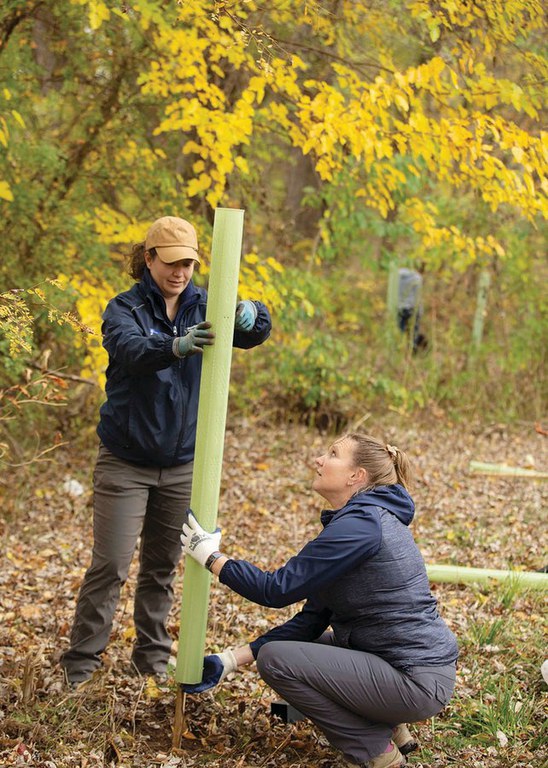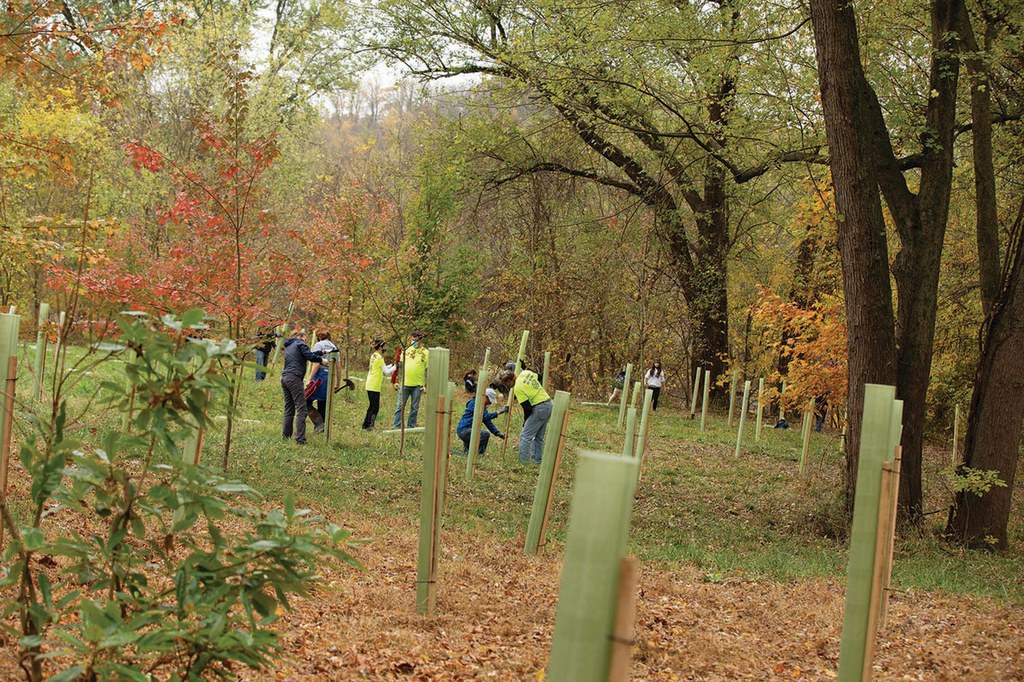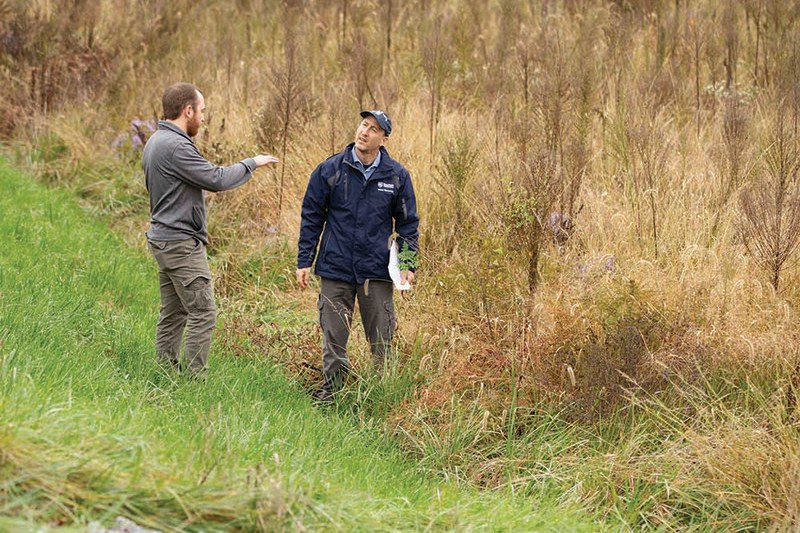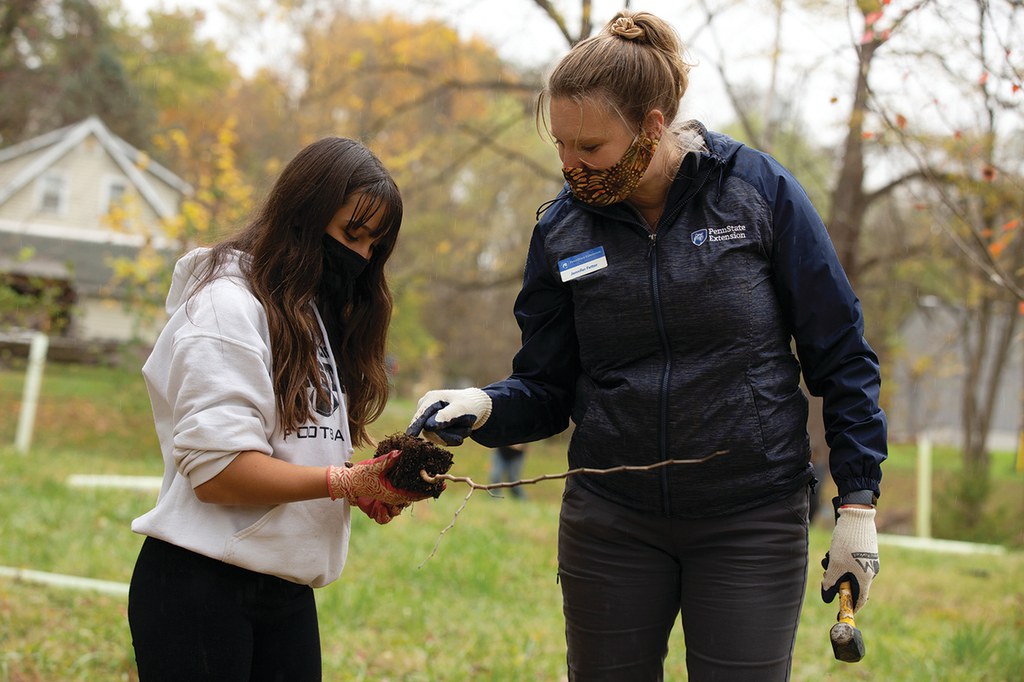Posted: December 2, 2022
Penn State Extension faculty and staff work to get the message out about the importance of protecting our precious water.

Jennifer Fetter, water resources team leader with Penn State Extension, kneeling, and Kristen Koch, program manager for the Penn State Agriculture and Environment Center, install a tree shelter on a newly planted seedling that is part of a riparian buffer restoration project.
One of the most important messages about water is something we all learn in school, but soon forget: "All the water we have on Earth is all the water we will ever have," said Jennifer Fetter, water resources team leader with Penn State Extension.
"We don't grow water like plants," she continued. "We don't make water in factories. We can't fly to another planet and bring water back here. All the water we have is trapped inside of Earth's atmosphere and just moves around in cycles."
And we reuse this water--again and again and again--for drinking, cooking, cleaning, laundry, flushing toilets, growing crops, and producing the materials we need for all the products we use. If we don't protect it, we will eventually run out of water that is good enough to use, Fetter said.
Because water touches every aspect of our lives, protecting and enhancing it is a vital goal for Fetter and her colleagues at Penn State Extension and the College of Agricultural Sciences.
These experts spend their days consulting dairy farmers about feeding practices, organizing stream cleanups, instructing commercial manure haulers, and analyzing water samples in the lab. Though spread across wide-ranging disciplines, they hold a shared aim: protect our waterways.
Agricultural practices can take a toll on water quality. Manure and fertilizers spread on agricultural fields contain nutrients such as nitrogen and phosphorus that help crops grow. But when it rains, any nutrients not taken up by the growing plants may run off fields and end up in our waterways, a phenomenon known as nonpoint-source pollution. Too many nutrients in water causes algae to bloom, blocking sunlight from underwater plants and depleting the oxygen dissolved in the water. This, in turn, can kill fish and other aquatic life that depend on the oxygen to survive.
To reduce the amount of nonpoint-source pollution that enters the Susquehanna River and Chesapeake Bay watersheds, Penn State dedicates much effort to improving and enhancing agricultural practices.
"Five years ago, through our strategic planning process, we redefined how extension was going to work with water to make sure that we're positioned well to address the needs of Pennsylvania," said Chris Houser, Penn State Extension assistant director for agronomy and natural resources programs. "Extension is playing a lead role in helping residents understand how they contribute to stress on water quality, and how they can protect and restore water resources for their local, personal, and home use on the farm or other local ecosystems."
Penn State also collaborates with state and federal agencies and the agricultural industry to help Pennsylvania meet its Watershed Implementation Plan, which is aimed at reducing pollution in the Chesapeake Bay watershed and is mandated by the U.S. Environmental Protection Agency (EPA).
In April, the EPA found that Pennsylvania's plan fails to meet nitrogen reduction goals, mainly due to lack of legislative funding and resources. According to the EPA, approximately 25,000 miles of streams in Pennsylvania--more than the earth's circumference--are considered unacceptable for fishing, recreation, or other uses. The EPA required Pennsylvania to submit a revised plan that meets its targets.
A significant challenge in advancing water quality has been securing financial resources, but good tidings have come by way of the recently passed Pennsylvania state budget. The Agricultural Conservation Assistance Program (ACAP), initiated by a coalition of conservation and agricultural organizations and academia, was funded in the 2022/23 state budget with $154 million.
It establishes a statewide cost-share program to help farmers implement best management practices. ACAP will be administered by the Pennsylvania State Conservation Commission and is modeled after Pennsylvania's Dirt, Gravel, and Low Volume Road Maintenance Program.

A group of local community volunteers plants a riparian buffer as part of the Greening the Lower Susquehanna volunteer program, a collaboration between the Penn State Agriculture and Environment Center and Penn State Extension.
Gathering Key Stakeholders
At the forefront of this issue is the Agriculture and Environment Center, an affiliated center of the college's Institute for Sustainable Agricultural, Food, and Environmental Science (SAFES). Focused on solving pressing water quality challenges related to the impacts of land use and land management, the center integrates education, research, community outreach, and extension assets.
"Given the urgency of the issue right now in Pennsylvania, we're planning to hold a conference later this year focused on resources, such as funding and critical staffing, that are needed to accelerate agricultural water quality goals," said Matt Royer, director of the center.
Known as the Pennsylvania in Balance series, these conferences gather agricultural, environmental, and regulatory interests together to help push forward innovations and strategies around agriculture and water quality, Royer explained.
"These conferences are absolutely instrumental and foundational in bringing diverse stakeholders to the table to find common solutions," said Mary Wirth, director of college relations and communications.
She noted that Penn State maintains close relationships with the Pennsylvania Department of Agriculture, the Pennsylvania Department of Environmental Protection, the Chesapeake Bay Foundation, stakeholders in production agriculture, and the EPA. "Penn State is a trusted source of research and science-based information," Wirth said. "We can work across boundaries. We are here to help, and people appreciate that."
A key element of the upcoming conference involves market-based solutions to water quality. "There's untapped potential for the corporate sector to help solve this," Royer said. "Corporate entities could prioritize food and commodities that are grown on farms with conservation- and water-quality-friendly practices in place. They could fold water quality goals into their corporate sustainability goals."
Harnessing corporate power means thinking big. Does it pay to think small? Royer pointed out that turning the tide on water quality starts with local leadership; for this reason, he helped create the Lancaster Watershed Leadership Academy, a twelve-month program for individuals working toward clean water.
"The Watershed Leadership Academy provides substantive training around watershed management, watershed partnership building, and leadership development to train the next generation of local watershed leaders," Royer said.
The academy kicked off in Lancaster County in 2020 as a collaboration between the Agriculture and Environment Center, Lancaster Clean Water Partners, and Penn State Extension's Rural-Urban Leadership Program. Seven scholars graduated in December 2021. Royer hopes to keep growing the program.
"The Chesapeake Bay starts in millions of backyards, so everyone plays a role in protecting water quality," he noted. "I'm most proud that at Penn State, we don't stop at a theoretical level but develop solutions to implement on the ground. We're well-positioned to do that as the land-grant university."

Andy Yencha, a water resources educator based in the Cumberland County Penn State Extension office, right, speaks with Alex Arcuri, MS4/GIS coordinator for East Pennsboro Township.
Customizable Volunteer Opportunities
Change starts in backyards, too. Pennsylvania residents can earn bragging rights and a "Watershed Friendly Property" yard sign for practices such as establishing rain gardens, cultivating native plants, reducing pollutants, and conserving water. The Watershed Friendly Property Certification Program is designed to expand the number of watershed-friendly properties throughout the state.
Penn State Extension Master Watershed Stewards helped create the Watershed Friendly Property Certification Program--in addition to an array of other efforts around water quality. These volunteers receive extensive coursework in water and natural resources. In return for the training, participants volunteer to educate the community about watershed stewardship based on university research and recommendations.
"As long as you desire to give back, there's a place for you in this program," said Erin Frederick, Master Watershed Steward statewide coordinator. "We'll provide you with the tools, resources, and everything you need to feel comfortable and give back in a meaningful way."
There is no "typical" Master Watershed Steward, Frederick said. Some participate remotely, writing articles or providing technical assistance for the volunteer portal. Others coordinate planting projects or collect water quality samples. Some love giving presentations and travel from library to library to educate the public about local water quality issues.
Participants often make friends and find a sense of community in the program, Frederick said. "We have a pretty broad brush of people, from college students all the way to retirees."
Master Watershed Stewards can customize the program around their interests. Potential activities include stream cleanups, invasive plant removal, planting riparian buffers, inspecting and maintaining stormwater basins, reforesting areas, creating nature trails, designing and helping to install demonstration rain gardens at municipal buildings, and monitoring streams for mussels.
What about backyards? They're about to get a boost. The Watershed Friendly Property Certification Program recently received a grant to branch out to larger institutional properties, including parks and campuses. City dwellers can participate as well. People who rent apartments without owning land still can take action to protect the watershed, Frederick pointed out.
New social opportunities are in the works. "We're starting some competitions between the counties, such as which county can get the most watershed friendly properties," Frederick said. "We're going to pass around a trophy."
Frederick wants to build connections around the state, so that folks in Montgomery County can share what they're doing with Allegheny County residents.
"Depending on funding, we'll be in forty-two counties this year," she said. Within the next five years, she hopes to offer the program in every county.
No-Stink Solutions
Robb Meinen is a senior extension associate who specializes in nutrient and manure management. He trains commercial manure haulers to apply manure to agricultural fields in a way that protects water quality.
Meinen said this involves questions such as: "When we apply manure, how far away do we need to stay from surface water or groundwater, like a well source, so that the nutrient does not transport to the water?"
Interpreting the nutrient management plan and application rate is another crucial area of education. "We want to apply the nutrient at or below crop needs," Meinen said. "How many gallons or tons per acre do I put on the field to get the right rate of manure support?"
As dairy extension educators, Rainey Rosemond and Carly Becker approach nutrient management from a different angle. They visit dairy farms to evaluate the efficiency of feeding programs, considering factors such as mixing order, mixing time, and animal drinking water cleanliness.
"If you have improper feed management, poor quality crops, and an inefficient mixing program, then the animals can sort out the long and fibrous feeds and eat just what we call the candy: the corn and concentrates," Rosemond said.
A well-managed feeding program ensures that every bite the animals take contains all the nutrients they need to milk well and maintain their health, Rosemond noted. Otherwise, feeding programs can result in wasted feed and nutrients. Instead of being utilized for milk production, the nutrients end up in manure.
"The more nutrients that end up as manure, the more nutrients eventually come back onto the land and potentially into the watersheds," Rosemond said.
Test the Waters
More than one million private water wells serve farms and rural homes throughout Pennsylvania. Unlike public water systems, none of these private wells are regulated by the state.
"If you are a private well owner, it's up to you to have your water tested to make sure it meets the drinking water standards," said Susan Boser, water resources extension educator.
Farmers and homeowners with private wells are responsible for all aspects of water system management, including routine maintenance, water testing, and installation of treatment equipment.
"What we find through our extension programming is that most people aren't having their water tested on a regular basis," Boser said. Sometimes water testing occurs only during a real estate transaction or when an issue emerges with the water, such as a taste, smell, or sickness.
Extension's Master Well Owner Network trains volunteers throughout Pennsylvania to help educate and empower rural homeowners on the proper management of private water wells. To date, more than 900 residents in 66 counties have received volunteer training. These volunteers have assisted more than 60,000 homeowners with private water systems.
Extension educators hold frequent drinking water workshops to educate private water system owners about well location, wellhead protection, and water testing and treatment. Short videos and fact sheets on the Penn State Extension website provide information about topics such as water softening and coliform bacteria. A webinar series covers a variety of private water topics, including common health and aesthetic impacts on drinking water supplies, preventing bacteria contamination, well construction, and septic systems.
Extension educators throughout Pennsylvania provide one-on-one assistance to residents. "We are always getting calls and emails from people who have questions," Boser said.
Common questions include: Where can I get my water tested? What should I test my water for? How can I treat this problem?
To answer the first question, Penn State's Agricultural Analytical Services Laboratory offers fee-based water testing to members of Penn State and the public alike. The lab is accredited by the Pennsylvania Department of Environmental Protection for drinking water analysis.
Boser often suggests testing water for bacteria, pH, and total dissolved solids. Bacteria can cause gastrointestinal illnesses and produce a bad taste or odor in water. Since the lab opened, about 46 percent of all drinking water samples have failed the drinking water standard for total coliform bacteria.
Some people are unaware of the dangers lurking in their private water supplies, noted John Spargo, director of the lab and associate research professor in the college's Department of Plant Science.
"Total coliform--an easy group of bacteria to test for--can indicate the sanitary protection of water systems," Spargo said. "While most coliform bacteria are harmless, their presence suggests there may be disease-causing microorganisms in the water. The only way to know is to have the water tested."
In addition to testing drinking water, the lab tests pond and lake water, livestock drinking water, irrigation water for nurseries and greenhouses, and irrigation water for turfgrasses.
A study conducted by an extension water resources specialist in the College of Agricultural Sciences suggested that dairy-herd water quality is linked to milk production. Spargo explained that if the water tastes bad, cows do not drink as much of it--thereby impacting their ability to produce milk.
In addition to providing water analysis for individuals, the lab helps support university research on nonpoint-source pollution in the Chesapeake Bay. "We do nutrient testing for folks collecting water samples from streams feeding into the Chesapeake Bay," Spargo said.
The lab also offers soil testing programs. "We measure the relative nutrients of soil and offer unbiased, research-based recommendations for fertilizers and guidance for applying just the right amount at the right time to support the crops," Spargo said.
The lab tested about 2,500 water samples during the last fiscal year. Over the years, the lab has seen a steady increase from the 1,000 samples tested in its first year.
"Water is a shared resource," Boser said. "Protecting your own water in your backyard, stream, or well helps people downstream who might encounter that same resource. We all must work together to protect and conserve water--it's a community effort."
The Next Generation of Water Stewards
"As the water team, we want to make sure the content we develop is accessible to youth," Fetter said. "We address the same priority issues that we bring to adult audiences with youth audiences in Pennsylvania."
To help create the next generation of water stewards and innovators, Penn State Extension offers a variety of resources for teaching youth about water:
- "Rain to Drain: Slow the Flow." As an introduction to green infrastructure and stormwater best management practices, this series of activities teaches youth and adults about the movement of stormwater in natural and developed communities.
- "Watershed Decisions Activity Kit." This hands-on, inquiry-based activity teaches older youth and adults about water quality issues surrounding small watersheds. Participants role play as members of a community organization interested in improving local water quality. They examine simulated water samples, explore the land uses in their community, and create a plan for improving their watershed on a limited budget. The kit received Excellence Awards from the National Association of Natural Resource Extension Professionals and the National Association of Extension 4-H Agents.
- "Dive Deeper: Youth Water Educators Summit." This multistate environmental education summit spotlights innovative teaching about water. Participants learn about current and emerging water issues and discover new resources to enhance science, technology, engineering, and math (STEM) education offerings.
- "Manure Management Planning for Youth Animal Projects." In Pennsylvania, everyone who produces manure or applies manure to the land--including youth raising animals for 4-H and FFA projects--must have a written plan about how to manage their manure. This curriculum includes hands-on activities and chapters on manure composition, soil types, manure impacts on water, mapping, and the basics of a Pennsylvania Manure Management Plan.
Although these resources were designed for youth, adults often utilize them as well. "I found that adults really thrive when you give them the opportunity for hands-on and experiential learning," Fetter said.
The water resources team soon will launch the Future Master Watershed Steward Program. Aimed at raising a new wave of Master Watershed Stewards, the program will train Master Watershed Stewards on starting youth clubs and school programs. Youth will explore streams and conduct service projects to help protect and care for Pennsylvania's waterways.
With every youth water program, Fetter said she hopes to inform and build the next generation of decision-makers, landowners, elected officials, and citizens to become good stewards of water.

Jennifer Fetter, water resources team leader, speaks with a young volunteer about how tree roots help to hold the soil together and reduce erosion that pollutes waterways.
How Can the Average Citizen Conserve and Protect Water?
"Normally, people would immediately think of things like turning the faucet off when they're brushing their teeth or disposing of waste properly, but I would challenge the average citizen to do something different," Fetter said. "Try to figure out both where your water comes from and where your water goes."
Gaining this awareness is a crucial first step toward change: "Water 100 percent comes from the environment--it does not magically appear out of the faucet," Fetter said.
Understanding this fact will motivate us to protect and keep waterways clean, Fetter contends. The other half of the equation is finding out where our water goes.
"When you flush the toilet, where does it go?" Fetter said. "When litter, pollutants, and chemicals from taking care of gardens or lawns get washed away, where do they end up? What body of water is potentially becoming contaminated because of the actions we're taking at our property?"
If residents are unsure about the origins or destinations of their water, Penn State Extension offers webinars and programs to educate people about the water that flows in and out of their homes. Master Watershed Stewards are available to answer any water-related questions at AskaMWS@psu.edu.
Pennsylvania has more than 86,000 miles of streams, rivers, and creeks, second only to Alaska.
"It's hard to walk around outside without tripping over a stream in Pennsylvania," Fetter said. "But we have a growing number--around 30 percent--of stream miles among those 86,000 that are impaired. Pennsylvania has a lot of water, but if we only have a lot of dirty and polluted water, it's no different from living in a place with extreme drought."
By Alexandra McLaughlin
Photos by Michael Houtz
Features
Breaking the Silence on Farm Stress
Farming has always been a demanding profession, but today's farmers face unprecedented pressures that can severely impact their mental health.
Biting Back
Research Targets Vector-Borne Diseases to Save Lives
Leading Forward
Ott brings deep connection to role of dean.


